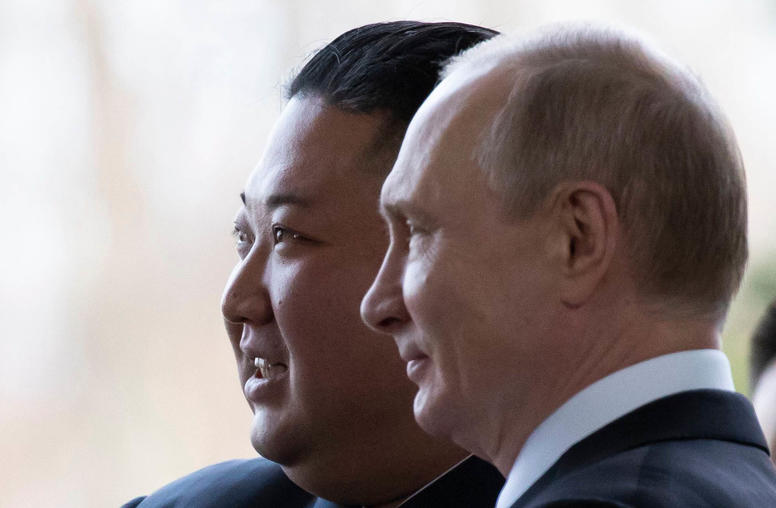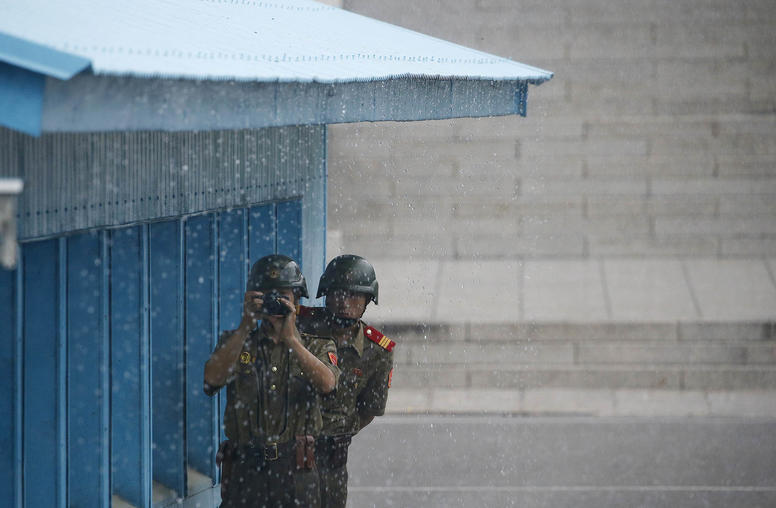Frank Aum on North Korea and Coronavirus
Despite reporting no confirmed cases, USIP’s Frank Aum says, “It’s safe to say the virus is in North Korea,” and that the isolated nation is still trying to “maintain the visage of invulnerability” through missile tests and other military demonstrations—all while instituting drastic public health measures.
On Peace is a weekly podcast sponsored by USIP and Sirius XM POTUS Ch. 124. Each week, USIP experts tackle the latest foreign policy issues from around the world.
Transcript
Tim Farley: Yesterday, the Chairman of Joint Chiefs of Staff General Mark Milley commented on the recent reports that North Korea had fired missiles and showed a display of force with some jets flying in the North. This was a report out of Seoul, South Korea. Here's the general yesterday:
Gen. Mark Milley (from recording): Uh, it's mixed right now in terms of the assessment. I don't think it's a particularly provocative or threatening to us as to what happened. It may be tied to some celebrations that are happening inside, uh, North Korea, uh, as opposed to any deliberate, provocation against us. So, another day or two should be clear in terms of what we pick up.
Tim Farley: We will await that. Let's meantime get some perspective on if there's anything to add to that, a perspective on that, plus the dealings that the United States is having with North Korea with its handling of the COVID-19 pandemic. An interesting piece. The COVID-19 crisis has the potential to ease tensions between Washington and Pyongyang, but it's more likely negotiations will remain deadlocked. That is the, the top headline of a piece that is coauthored by Joseph Yun who was the ambassador as well as Paul Kyumin Lee and Frank Aum who is with us here on POTUS. Frank Aum is a senior expert on North Korea with the United States Institute of Peace, the Twitter handle, @USIP. Frank Aum, welcome. Thank you for being here today.
Frank Aum: Thanks for having me on, Tim. Tim Farley: First, anything to add to what a general Milley said about the report of missiles being fired and jets flying in North Korea?
Frank Aum: Well, I think, um, there's many reasons why North Korea has been conducting a variety of tests. Uh, and this has been the fifth test, uh, of missiles over the past several weeks. And the first one is pretty obvious. It's that North Korea wants to continue to test and improve its military capabilities, which it has been doing with each progressive, uh, ballistic missile test multiple rocket launch. And the most recent ones were a cruise missile test as well as a surface to, I'm sorry, air to surface missile test. So that's one potential reason, but also North Korea could be trying to signal both internally and externally that it is in control of the situation, uh, and that other external powers shouldn't be trying to intervene like the U.S. or South Korea to take advantage of the pandemic crisis. North Korea oftentimes uses missile tests and other types of provocations to put pressure on the United States. So that could be another reason as well to try to get the U.S. to return to negotiations through pressure.
Tim Farley: As you know, this is taking part or taking place in the context of outreach from the United States in North Korea to one another, although it seems to be kind of cautious outreach at this particular point. I guess my first question is how is it that we are or anyone is able to understand exactly what the situation is in North Korea with its being a closed society? Add that on top of the fact that even in an open society or a more open society like the United States, Great Britain and other countries where you can at least look at testing data, what do you get out of North Korea? How can you figure out whether or not they are in the midst of the same kind of a crisis that other places are?
Frank Aum: Tim, that's absolutely the right. One of the problems that we have with North Korea is the lack of transparency and the lack of accurate reporting from the government. But I think there's many reasons to not trust North Korea’s claim that there have been no confirmed cases of coronavirus in the country. First, from a statistical point of view, it's hard to believe because of North Korea’s proximity to China, its shared border and all the trade that happens between North Korea and China, which is one of the virus hotspots. But I think also we know based on, uh, comments made by the U.S. military commander in, in South Korea, General Abrams, that U.S. intelligence believes that the virus has made its way into North Korea. We also know that from reporting, and this is unofficial, but reporting from South Korean organizations on the ground that have contacts in North Korea they are indicating that there have been, uh, hundreds of deaths, um, among North Korean military officers along the border, as well as deaths of North Korean military medical officials who've been treating the situation. So, I think it's safe to say that the virus is in North Korea. At the same time, evidence also suggests that North Korea has been very successful in flattening, if not even squashing the curve altogether by taking very early and robust and anti-epidemic measures.
Tim Farley: Frank Aum with us, Frank is a senior expert, North Korea, United States Institute of Peace, coauthor of a piece that appeared in the Hill about the current discussion between the U.S. and North Korea about the COVID-19 pandemic. You note that Kim Yo Jung, who is the sister and a senior government official, sister of a leader, Kim Jong Un had praised a letter from President Trump, expressing her brother's appreciation, noting the letter had come at a time of big differences and challenges in developing ties. But this stands in contrast to the North Korean Ministry of Foreign Affairs, which says that Pyongyang has lost the appetite for any dialogue with the U.S., singling out the Secretary of State Mike Pompeo as the culprit. So are we getting mixed messages from North Korea?
Frank Aum: Well, I think they want to maintain the relations at the leader level that Kim Jung Un has with President Trump. They feel like that's the best channel to achieve some of their aims in terms of sanctions relief and other steps that would reduce tensions on the peninsula. Right now they are very frustrated by what they believe are you know, senior advisors of President Trump, like Secretary Pompeo, who is maintaining a rigid position and not providing sanctions relief to North Korea. And so they want to, similar to President Trump, they want to maintain good relations, but they're also letting the U.S. know that they're not willing to reengage in negotiations until they have more concessions from the United States, particularly related to sanctions relief.
Tim Farley: Is it your sense that we are seeing Kim Jong Un more or less than you typically would see him? I'm just wondering if this has affected his behavior at all.
Frank Aum: Yeah, if you're talking about the COVID-19 situation, there have been reports of Kim Jung Un being present at military drills as well as at different state functions. I haven't seen any media pictures of him wearing masks when he tours facilities or military drills. So my sense right now is that North Korea feels very confident that they are adopting the right measures to address the situation. Like I mentioned before, North Korea was the first country to implement a nationwide lockdown. They did this around January 21st, and this is when the crisis was just starting in China and also, around the same time that the U.S. and South Korea were reporting their first infections. And just by comparison, the next country to implement a nationwide lockdown, Italy, didn't do this until six weeks later when there are already hundreds of deaths in the country. So I think North Korea has been very effective with border closures, quarantines of foreigners as well as North Koreans coming from infected countries. They're using social distancing measures and public education efforts, you know, for example, wearing masks. So my sense is that North Korea seems to be pretty confident in, the measures that they're taking at the same time, they're continuing to adopt rigorous anti-epidemic measures. We've heard this from the recent Politburo meeting a few days ago.
Tim Farley: Last question. In the conclusion of the piece, you have written that even if the virus becomes a major crisis, like the famine in the 1990s, North Korea would likely seek aid first from allies like China and Russia and only indirectly from the United States through nongovernmental and UN organizations. What does the U.S. have to gain with this outreach to North Korea?
Frank Aum: I think, uh, from a moral perspective, but also from the perspective of good faith, they can signal to North Korea that they are willing to engage and, and provide humanitarian assistance, um, in times of need for North Korea. But like I said before, that North Korea is still trying to maintain the visage of invulnerability and maintaining authority and control. So I think if we're in a situation where, uh, the crisis is escalating in North Korea, they would first turn to their allies like China, Russia, they already have in terms of getting testing kits and other personal protective equipment. And they also have turned to international organizations like the U.N., the World Health Organization. They would turn to these organizations and countries first before going to the U.S. or South Korea, again, because they want to, not present any vulnerability and also by way of comparison, they want to show that they're doing better in terms of responding to this crisis rather than countries like South Korea, their neighbor to the South.
Tim Farley: Frank Aum, thank you for joining us on POTUS today.
Frank Aum: Thank you for having me.
Tim Farley: Frank Aum is a senior expert on North Korea at the United States Institute of Peace, co-author of a piece that appeared in the Hill, “North Korea, Coronavirus, Missiles and Diplomacy.” The COVID-19 crisis has the potential to ease tensions between Washington and Pyongyang but it's more likely negotiations will remain deadlocked. You can find that piece online and you can find Frank Aum as well as the United States Institute of Peace on Twitter @USIP.



